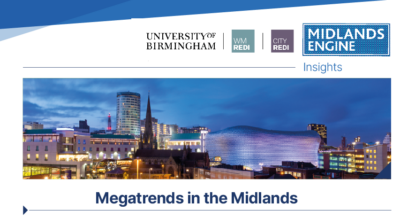
Transport
Apr 25 2024
Birmingham Airport (BHX) has achieved Level 3 (optimisation) of the Airport Carbon Accreditation (ACA) scheme for a second year.
Read more
The rise of technology and digitisation, Climate Change, rising geopolitical tensions and demographic changes form the four major megatrends identified in a new report.
Published by the Midlands Engine and the University of Birmingham’s City-Region Economic Development Institute (City REDI), the report explores key themes within these megatrends including the rise of AI, rising temperatures, the Russia-Ukraine war and an ageing population.
These can have significant and differing consequences within the Midlands economy and its communities, so the report is vital to aid our understanding of them.
The report breaks down each individual megatrend and how they will, and in many instances already are, impacting our region.
This trend includes the rise of artificial intelligence which has potential benefits for a host of Midlands sectors including transportation, advanced manufacturing and healthcare. AI could also influence other megatrends detailed in the report with the potential to provide major assistance in the fight against climate change.
Beyond AI, this megatrend could unlock advancements and innovation in the agri-tech and MedTech clusters, as well as help to create more sustainable business models.
However, the report does identify that this megatrend presents challenges for the Midlands, particularly around potential job losses as a result of automation.
The effects of climate change are already impacting the Midlands.
Crop yields are being negatively affected by rising temperatures and extreme weather events, leading to ‘climateflation’.
The Midlands also has some of the most at-risk areas in the UK for flooding. As recently as the end of October did we see the effects of Storm Babet with widespread flooding across Lincolnshire, Derbyshire and Nottinghamshire.
To meet these challenges, the report states that the Midlands needs to step up efforts to de-carbonise its sectors; upgrade to a more efficient energy system fit for the 21st century; and continue to innovate through research and development.
The next megatrend has been identified by the World Economic Forum at the third biggest risk over the next two years.
Economic warfare is becoming increasingly commonplace, leading to trade conflicts like the ongoing US-China trade war.
The vulnerability of supply chains essential for Midlands industries has been exposed following events like Russia’s invasion of Ukraine, Covid-19 pandemic and Brexit.
While some of these disruptions are transitory, others are becoming the new normal as businesses start to adapt to reconfigure their supply chains.
Ageing populations, migration, increasing urbanization and the consequences for health and housing are all part of the demographic trends affecting the Midlands.
The report also considers the issue of housing affordability with rents and house prices rising significantly on a national level, with the Midlands having a varied picture with differences in demand and supply which will require nuanced solutions developed at a local level.
Workforce health and wellbeing are two other elements to this megatrend, now more prevalent after the COVID-19 pandemic than ever before which will require employers to support employees so they remain productive in the workforce.
The report also identifies the advantages and disadvantages of each megatrend for the Midlands Engine economy. Advantages include the region’s geographical location and flourishing advanced manufacturing sector, whilst its vulnerabilities include a dependence on manufacturing, an economy integrated into vulnerable global supply chains and infrastructure that needs improvement if the region is to achieve its potential.
Understanding the likely direction of these megatrends can pave the way for joined-up national, regional and local policy to successfully minimize the threats and seize the opportunities.
The report concludes that the region needs to be prepared for what is a ‘new age’. Importantly, within the Midlands Engine, the way that the megatrends interact with each other means that different sub-groups and local areas may be impacted to varying extents. Therefore region-wide policy priorities need to be sensitive to the differences between places or risk accentuating intra-regional inequalities.

Transport
Apr 25 2024
Birmingham Airport (BHX) has achieved Level 3 (optimisation) of the Airport Carbon Accreditation (ACA) scheme for a second year.
Read more
Global
Apr 24 2024
World-leading materials science and technology consultancy Lucideon is targeting international growth with expansion in the Japanese market.
Read more
Global
Apr 18 2024
The Midlands Engine Partnership will host a Pavilion for the very first time at this year’s UK Real Estate Infrastructure Investment Forum [21-23 May], providing regional partners with a platform to showcase their investment propositions, worth in excess of £42bn, to a global audience.
Read more